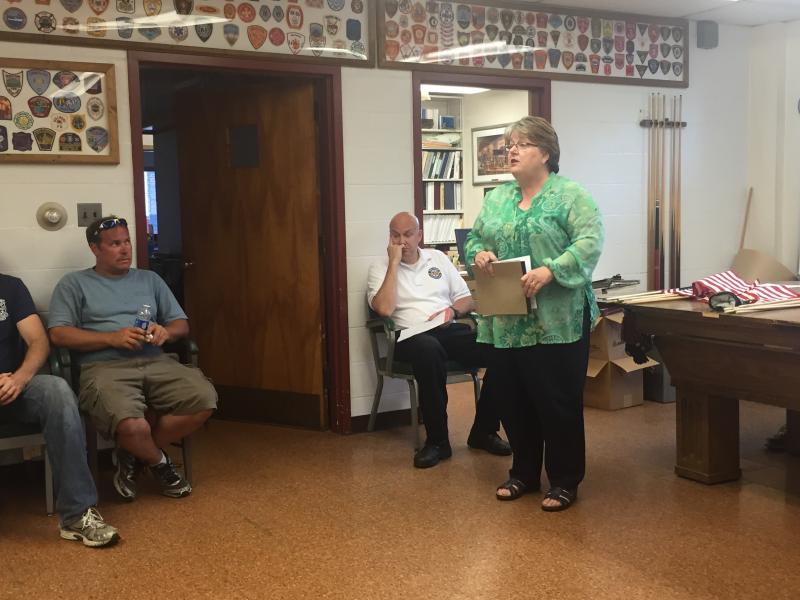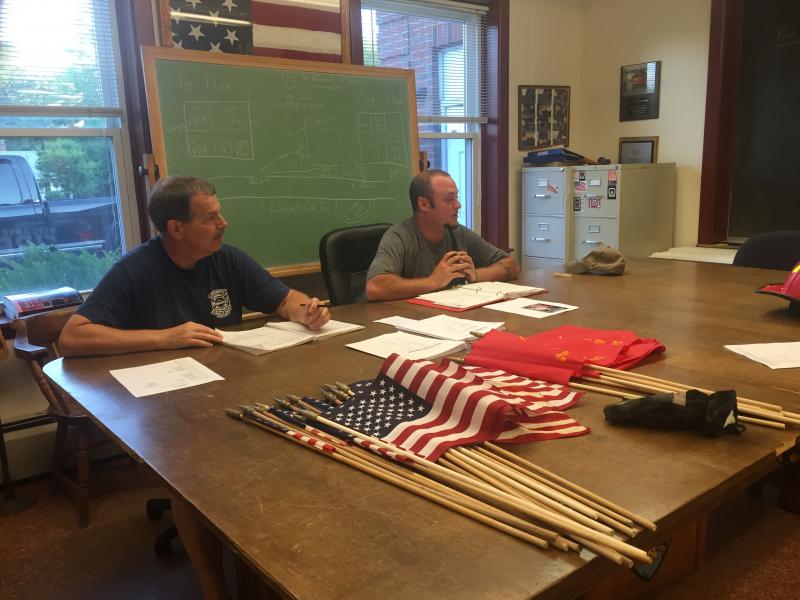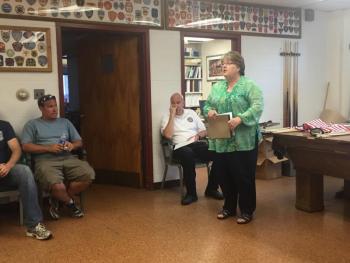Firefighters, Anderson talk
Wiscasset’s firefighters on July 6 told Town Manager Marian Anderson the issues some of them have with the town’s move to direct deposit-only for paychecks.
Some said they preferred deciding for themselves how much, if any, of their pay to leave in the bank. Anderson was also asked if someone wouldn’t get paid if they don’t do the paperwork for direct deposit.
If anyone’s paperwork went undone, she would take the matter to selectmen, because they set the policy, she answered. “I don’t write policy. My job is to administrate it.”
The board did it because large numbers of checks were going uncashed, which is a problem when balancing a checkbook, she said.
“And not just firefighters, but employees in general sometimes held onto their checks,” Anderson said.
An auditor recommended the change, which also passed a check with legal counsel, Anderson said.
“It’s not in any way meant to inconvenience anybody. It’s meant to just streamline the payroll process through the town office ... It’s not meant to be punitive in any way,” she added at another point. Employees of other departments have had some of the same questions and comments, Anderson said.
To save members from having to come to the town office during business hours to fill out the paperwork, she was leaving forms they could return later, she said. “If I can help in any way, I’m pleased to do it,” she said.
Fire Captain Nick Grover said after the meeting that he wasn’t sure he would do the paperwork. He might end up leaving the department over it, after eight years of service, he said. He doesn’t want to, and it would be a hard decision, but he also doesn’t feel the direct deposit should be required, Grover said.
During the talk with Anderson, Grover said: “It would have been nice to have been able to voice our opinions before this all went down.” Anderson said the board had discussed it several times. She offered to start sending the board’s agendas to any members who would like them. The agendas are also posted on the town’s website (at www.wiscasset.org), she noted.
Longtime member David Gagnon signed onto the change for another town job he has. He had been concerned about direct deposit and had even been willing to cover the town’s expense of a check. Then he spoke with a financial advisor. “He said, ‘Pick and choose your battles. That’s not a big one.’ So I chose to sign it.
“I’m still not happy about it, but it’s just the way it is,” Gagnon told Anderson.
Selectmen’s Chairman Judy Colby also attended the meeting, but firefighters had no questions for her. Asked afterward how she thought it went, Colby said: “I think it was a very good meeting.”
At the discussion’s outset, Merry cautioned members that it was only about direct deposit. If they wanted to ask about something else, Anderson could be invited back, the chief said. “Let’s stay on track.”
The firefighters stayed on-topic and so did Anderson, except when she mentioned the new insurance the town is providing firefighters. “It’s 100 percent paid by the taxpayers. I think that’s a great sign of their commitment to you for the good work that you do,” Anderson told the members.
No one brought up plans to petition for a town vote on whether or not to let firefighters wash their personal vehicles at the station; the petition is still in the works, Merry said earlier in the meeting, before Anderson addressed the members.
Also July 6, Merry announced Ryan Chadwick had made lieutenant; and that the department was losing a member moving to Whitefield.
EMS Director Toby Martin announced plans to offer firefighters a 68-hour course to become emergency medical responders. It’s part of an effort toward more collaboration between the two departments, Martin said.
EMRs can start the help on bleeding, an airway issue and shock, he said. “Real emergencies that you can take care of ... until (an ambulance) can get to the scene ...”
If at least 10 Wiscasset firefighters sign up, it will be a closed course; otherwise, firefighters in Edgecomb and Westport Island will also be able to take it, Martin said. Both towns use Wiscasset Ambulance Service.
To cut the cost to take the class by almost $300 a student, to $360, Martin will get no pay for teaching it. He believes getting people into the class is that important, he said. “We have a great opportunity with this program.”
In email responses to questions from the Wiscasset Newspaper July 7, Martin said the training will help when multiple ambulance calls come in at once. “Currently we only have three members on our roster that live in the community. Having members of the fire department training in EMS helps with life-saving procedure(s) while waiting for a mutual aid ambulance,” Martin explained.
Event Date
Address
United States




























